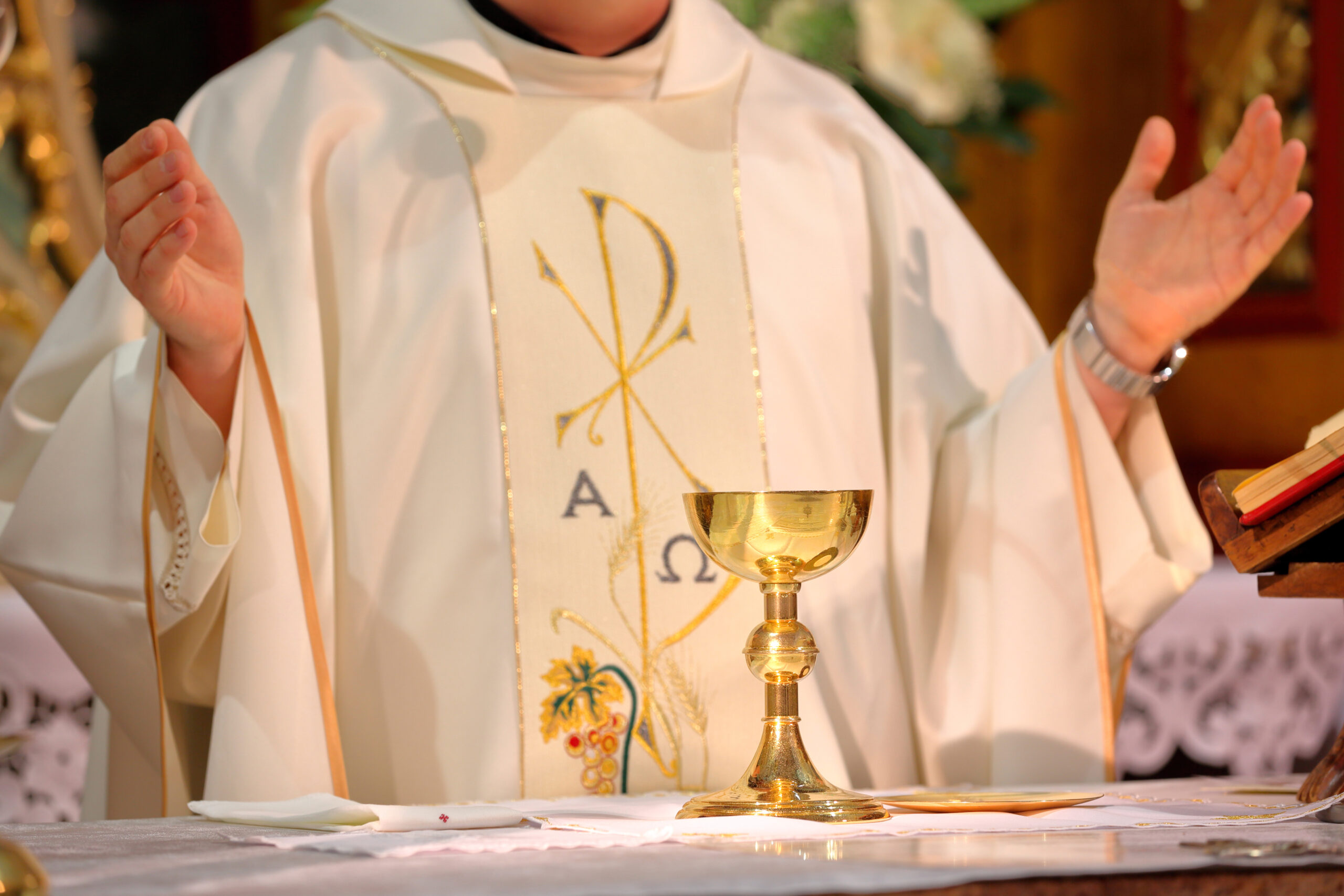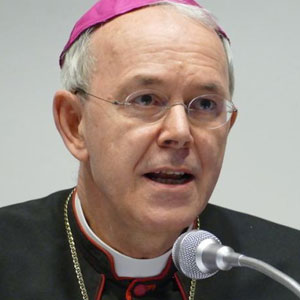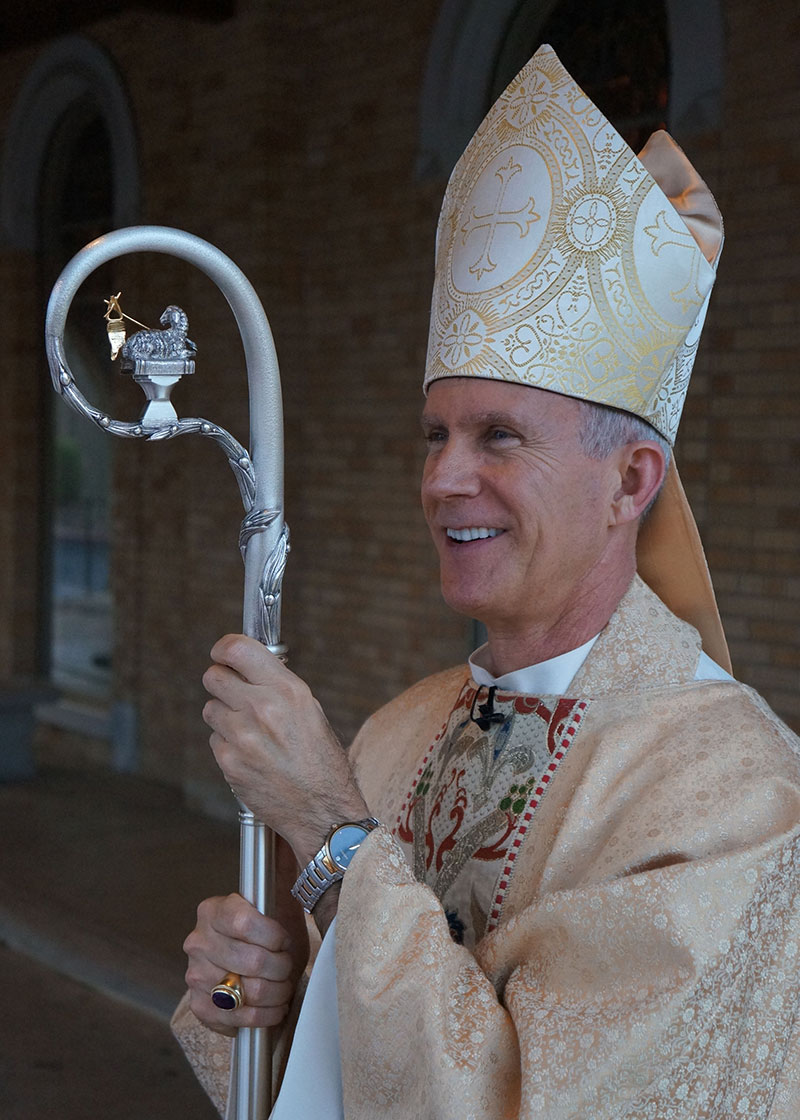The Holy Mass — Our Divine Treasure
Dear brothers and sisters in Christ! In these moments we participate in the most holy, in the most great, in the most wonderful and in the most divine work in all creation and in all eternity: the Holy Sacrifice of Mass. The Holy Mass is in substance the same as the Holy Sacrifice of Golgotha. We are present at the same work which Christ accomplished on the Cross and which Christ the Eternal High Priest is now and forever acting in Heaven in the presence of the Holy Trinity: the sacrifice of the eternal and everlasting Covenant.
Archbishop Fulton Sheen said: “There are certain things in life which are too beautiful to be forgotten, such as the love of a mother. Hence, we treasure her picture. The love of soldiers who sacrificed themselves for their country is likewise too beautiful to be forgotten; hence, we revere their memory on Memorial Day. But the greatest blessing which ever came to this earth was the visitation of the Son of God in the form and habit of man. His life, above all lives, is too beautiful to be forgotten; hence, we treasure the divinity of His words in Sacred Scripture, and the charity of His deeds in our daily actions. Unfortunately, this is all some souls remember, namely, His words and His deeds; important as these are, they are not the greatest characteristic of the divine Savior. The most sublime act in the history of Christ was His death. … If then death was the supreme moment for which Christ lived, it was therefore the one thing He wished to have remembered. He did not ask that men should write down His words into a scripture; He did not ask that His kindness to the poor should be recorded in history; but He did ask that men remember His death. And in order that its memory might not be any haphazard narrative on the part of men, He Himself instituted the precise way it should be recalled.”
Archbishop Sheen continues, saying: “Hence the Mass is to us the crowning act of Christian worship. A pulpit in which the words of our Lord are repeated does not unite us to Him; a choir in which sweet sentiments are sung brings us no closer to His Cross than to His garments. A temple without an altar of sacrifice is non-existent among primitive peoples, and is meaningless among Christians. And so in the Catholic Church the altar, and not the pulpit or the choir or the organ, is the center of worship, for there is re-enacted the memorial of His Passion. Its value does not depend on him who says it, or on him who hears it; it depends on Him who is the One High Priest and Victim, Jesus Christ our Lord. The Mass is the greatest event in the history of mankind; the only holy act which keeps the wrath of God from a sinful world, because it holds the Cross between heaven and earth.”
When we recognize and really believe in what each Holy Mass is, then every detail of the rite of the Holy Mass, every word, every gesture is important, is deeply meaningful and spiritual. Even from the moment we enter a church to participate in the Holy Mass, we have to try to lift up our mind and heart to Golgotha and to the heavenly liturgy. Blessed Cardinal John Henry Newman wrote: “The Catholic Church alone is beautiful. The celebrant, deacon and subdeacon, acolytes with lights, the incense, and the chanting — all combine to one end, one act of worship. You feel it is really a worshipping; every sense, eyes, ears, smell, are made to know that worship is going on. The choir singing out the Kyrie, and the priest and his assistants bowing low, and saying the Confiteor. This is worship, and it is far above reason” (words of Mr. White in the novel Loss and Gain).
Saint John Mary Vianney explained the greatness of the Holy Mass: “All good works together are not of equal value with the sacrifice of the Mass, because they are the works of men, and the Holy Mass is the work of God. Martyrdom is nothing in comparison; it is the sacrifice that man makes of his life to God; the Mass is the sacrifice that God makes to man of His Body and of His Blood. Oh, how great is a priest! If he understood himself he would die. God obeys him; he speaks two words, and Our Lord comes down from Heaven at his voice, and shuts Himself up in a little Host. God looks upon the altar. ‘That is My well-beloved Son,’ He says, ‘in whom I am well-pleased.’ He can refuse nothing to the merits of the offering of this Victim. If someone said to us, ‘At such an hour a dead person is to be raised to life,’ we should run very quickly to see it. But is not the Consecration, which changes bread and wine into the Body and Blood of God, a much greater miracle than to raise a dead person to life? If we knew the value of the Holy Sacrifice of the Mass, or rather, if we had faith, we should be much more zealous to assist at it.”
Saint Peter Julian Eymard said: “Why has our Lord willed to establish so close a relation between the Sacrament of the Eucharist and His death? It was, in the first place, to remind us of the price His Sacrament cost Him. The Eucharist, in fact, is the fruit of the death of Jesus. The Eucharist is a testament, a legacy, which becomes valid only at the death of the testator. To give His testament legal force, Jesus had then to die. Every time we come into the presence of the Eucharist, we may therefore say: ‘This precious testament cost Jesus Christ His life; He thereby shows us His boundless love, for He Himself said there is no greater proof of love than to lay down one’s life for one’s friends. Jesus gave me the greatest proof of His love when He went to His death in order to make the Eucharist possible and give it to me. How many think of this price paid for the Eucharist? And yet Jesus is there to remind us of it. But like unnatural children we are bent only on using and enjoying our riches, without ever thinking of the One Who acquired them for us at the cost of His life” (The Real Presence. Eucharistic Meditations, ch. XIII).
Dear brothers and sisters, let us receive the Eucharistic Lord with love, with purity of heart, with a gesture of adoration kneeling down, with a gesture of humility and littleness opening our mouth and receiving the Holiest of Holies, the King of the universe, in the little sacred Host. O Lord, when we have You in the Eucharist, we have all things and we want for nothing. Amen.


